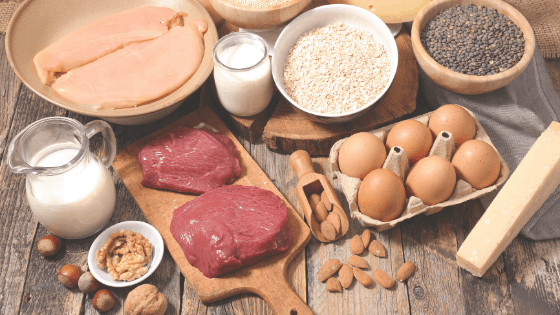
17 May How Much Protein Do We Need?
These days it seems everyone is obsessed with high-protein everything. Age, activity and health make everyone’s needs a little bit different. This can make it difficult to navigate a healthy and safe dietary intake.
If you’re wondering how much protein you really need, read on for some healthy guidelines, good sources to consume and how to promote muscle gain.
What Is It?
Protein is made up of amino acids which are used throughout the body. It is used to make up almost everything from skin and hair to bone and muscle. In addition, they are necessary for your body to make enzymes, precursors to hormones and vitamins, cellular receptors, and transport carrier functions in the body. Proteins are really necessary in our bodies! But how much do we really need?
How Much Protein Do I Need?
Obviously, protein intake is necessary for all humans based on that list of uses in our body. However, how much you need varies on your health, age/developmental stage, sex, weight, and activity level.
Most Americans have no problem getting plenty. The Recommended Dietary Allowance for the average adult is about 0.36 g/pound of body weight. A general guideline for protein intake at different developmental stages is as follows:
- Babies need about 10 grams a day.
- School-age kids need 19-34 grams a day.
- Teenage boys need up to 52 grams a day.
- Teenage girls need 46 grams a day.
- Adult men need about 56 grams a day.
- Adult women need about 46 grams a day
- Pregnant/Breastfeeding women need about 71 grams
However, this does not take into account individual ages, stages of life, size/weight, activity, etc. It’s best to individually calculate your needs since everyone is different. For example, athletes and seniors require 25% more due to increased exercise and sarcopenia, or muscle loss with aging. It is best to calculate protein needs based on your lean muscle weight.
To calculate individual needs based on weight, you could follow this general guideline:
- Toddlers 1-3 – 0.45-0.55 g /pound body weight
- Children 4-6 – 0.5 g /pound body weight
- Children 7-14 – 0.45 g/pound body weight
- Teens – 0.4 g /pound body weight
- Athletic Teens – 0.45-0.6 g /pound body weight
- Average Adult – 0.36 g /pound body weight
- Athletic Adults – 0.45 g /pound body weight
- Pregnant/Breastfeeding Women –
0.45 g /pound body weight - Seniors – 0.45 g/pound body weight
For some people with kidney problems or other issues, too much protein can be detrimental. For the average person, this is usually not an issue (even if you have a lot of protein in your diet). If you have ever been told to control your protein intake, please refer to your doctor’s recommendation.
How Do I Get It?
Protein is mainly found in meat, fish, dairy products, beans/legumes, nuts, seeds and soy. We recommend avoiding dairy due to the inflammatory properties and soy because of how it is processed and the risk of its estrogen mimicking properties. Vegetables have a small amount of protein, too, but are not considered a significant source of protein. It is best to consume your required protein intake by splitting it up throughout the day in each meal and snack.
The list below gives you an estimate of protein in high quality sources:
- Grassfed/Free Range Beef/Pork/Chicken (~6-9 g/oz)
- Wild Caught Fish
- Pasture Raised Eggs (~6-8 g/ egg)
- Legumes (~7-8 g/ Cooked 1/2 C)
- Nuts (~4-8 g/ 1/4C)
- Seeds (~4-8 g/ 1/4 C)
- Organic Dairy (varies)
- Organic Soy (varies)
- Collagen & Whey Protein
Building Muscle
A common misconception is that simply eating protein will increase muscle mass. Muscle can only be built through work (ie exercise) and the proper amount of amino acids, plus adequate calories and hormone balance. It is also good to note that if you don’t have enough energy (calories) the body will break down muscle for energy before breaking down fat to get what your body needs. Also, if you don’t have enough protein, your muscles will be broken down to give the body what it needs. Fun fact: muscle breaks down a little bit with all exercise, making proper nutrition important.
Timing of protein intake is very important with exercise and trying to build muscle. Getting a protein shake after a workout can help you get easy, extra protein for the exercising you are doing! You want to properly nourish yourself before and after a workout to maximize your potential to build muscle.
Protein Bars and Drinks
Protein bars and drinks can be a convenient way to quickly replace nutrition after a workout. However, beware of some “healthy” foods. Sometimes they are loaded with sugar, salt, additives, preservatives and unhealthy processed food sources. A good rule of thumb is to keep protein grams higher than sugar grams, and always look for ingredients you recognize. The fewer ingredients = the better. Also, look for responsibly sourced foods like grass-fed collagen or whey and organic (but be careful with organic! It’s used as a big marketing tool now!) This is why I love making smoothies for nutrition replenishment; I know I am getting whole foods (fruit & vegetables), no added sugar, and high quality protein and fats.
If you are looking for someone to help you with what to eat and how to achieve that, what are you waiting for?! Schedule a free exploration call with me today!


